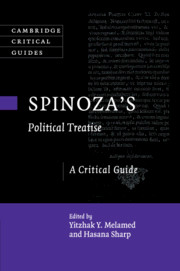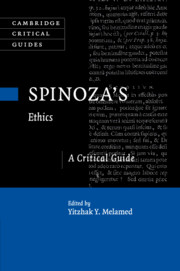49 results
2 - Spinoza’s Metaphysics of Substance
-
-
- Book:
- The Cambridge Companion to Spinoza
- Published online:
- 14 October 2021
- Print publication:
- 28 October 2021, pp 61-112
-
- Chapter
- Export citation
Index
-
- Book:
- Spinoza's <I>Political Treatise</I>
- Published online:
- 19 July 2018
- Print publication:
- 02 August 2018, pp 213-215
-
- Chapter
- Export citation
Abbreviations
-
- Book:
- Spinoza's <I>Political Treatise</I>
- Published online:
- 19 July 2018
- Print publication:
- 02 August 2018, pp xiii-xiv
-
- Chapter
- Export citation
Introduction
-
-
- Book:
- Spinoza's <I>Political Treatise</I>
- Published online:
- 19 July 2018
- Print publication:
- 02 August 2018, pp 1-11
-
- Chapter
- Export citation
Acknowledgments
-
- Book:
- Spinoza's <I>Political Treatise</I>
- Published online:
- 19 July 2018
- Print publication:
- 02 August 2018, pp xii-xii
-
- Chapter
- Export citation
Contents
-
- Book:
- Spinoza's <I>Political Treatise</I>
- Published online:
- 19 July 2018
- Print publication:
- 02 August 2018, pp vii-viii
-
- Chapter
- Export citation
Dedication
-
- Book:
- Spinoza's <I>Political Treatise</I>
- Published online:
- 19 July 2018
- Print publication:
- 02 August 2018, pp v-vi
-
- Chapter
- Export citation
Copyright page
-
- Book:
- Spinoza's <I>Political Treatise</I>
- Published online:
- 19 July 2018
- Print publication:
- 02 August 2018, pp iv-iv
-
- Chapter
- Export citation
Contributors
-
- Book:
- Spinoza's <I>Political Treatise</I>
- Published online:
- 19 July 2018
- Print publication:
- 02 August 2018, pp ix-xi
-
- Chapter
- Export citation
Chapter 10 - When Having Too Much Power Is Harmful
-
-
- Book:
- Spinoza's <I>Political Treatise</I>
- Published online:
- 19 July 2018
- Print publication:
- 02 August 2018, pp 161-174
-
- Chapter
- Export citation
Bibliography
-
- Book:
- Spinoza's <I>Political Treatise</I>
- Published online:
- 19 July 2018
- Print publication:
- 02 August 2018, pp 204-212
-
- Chapter
- Export citation

Spinoza's Political Treatise
- A Critical Guide
-
- Published online:
- 19 July 2018
- Print publication:
- 02 August 2018
General Index
-
- Book:
- Spinoza's <I>Ethics</I>
- Published online:
- 01 June 2017
- Print publication:
- 25 May 2017, pp 341-345
-
- Chapter
- Export citation
Chapter 6 - The Causes of Our Belief in Free Will: Spinoza on Necessary, “Innate,” yet False Cognition
-
-
- Book:
- Spinoza's <I>Ethics</I>
- Published online:
- 01 June 2017
- Print publication:
- 25 May 2017, pp 121-141
-
- Chapter
- Export citation
Contents
-
- Book:
- Spinoza's <I>Ethics</I>
- Published online:
- 01 June 2017
- Print publication:
- 25 May 2017, pp v-vi
-
- Chapter
- Export citation
Bibliography
-
- Book:
- Spinoza's <I>Ethics</I>
- Published online:
- 01 June 2017
- Print publication:
- 25 May 2017, pp 320-336
-
- Chapter
- Export citation
Figures
-
- Book:
- Spinoza's <I>Ethics</I>
- Published online:
- 01 June 2017
- Print publication:
- 25 May 2017, pp vii-vii
-
- Chapter
- Export citation
Introduction
-
-
- Book:
- Spinoza's <I>Ethics</I>
- Published online:
- 01 June 2017
- Print publication:
- 25 May 2017, pp 1-11
-
- Chapter
- Export citation

Spinoza's Ethics
- A Critical Guide
-
- Published online:
- 01 June 2017
- Print publication:
- 25 May 2017
Copyright page
-
- Book:
- Spinoza's <I>Ethics</I>
- Published online:
- 01 June 2017
- Print publication:
- 25 May 2017, pp iv-iv
-
- Chapter
- Export citation

